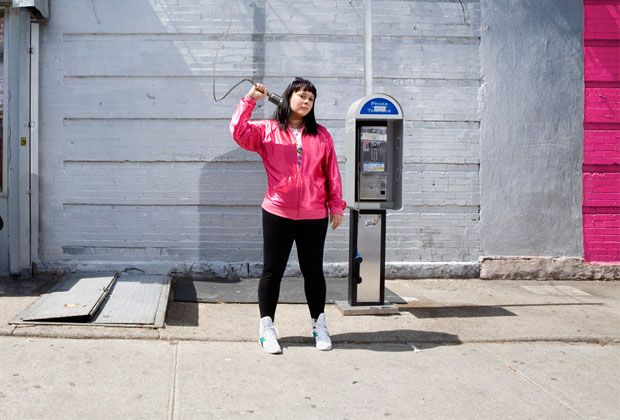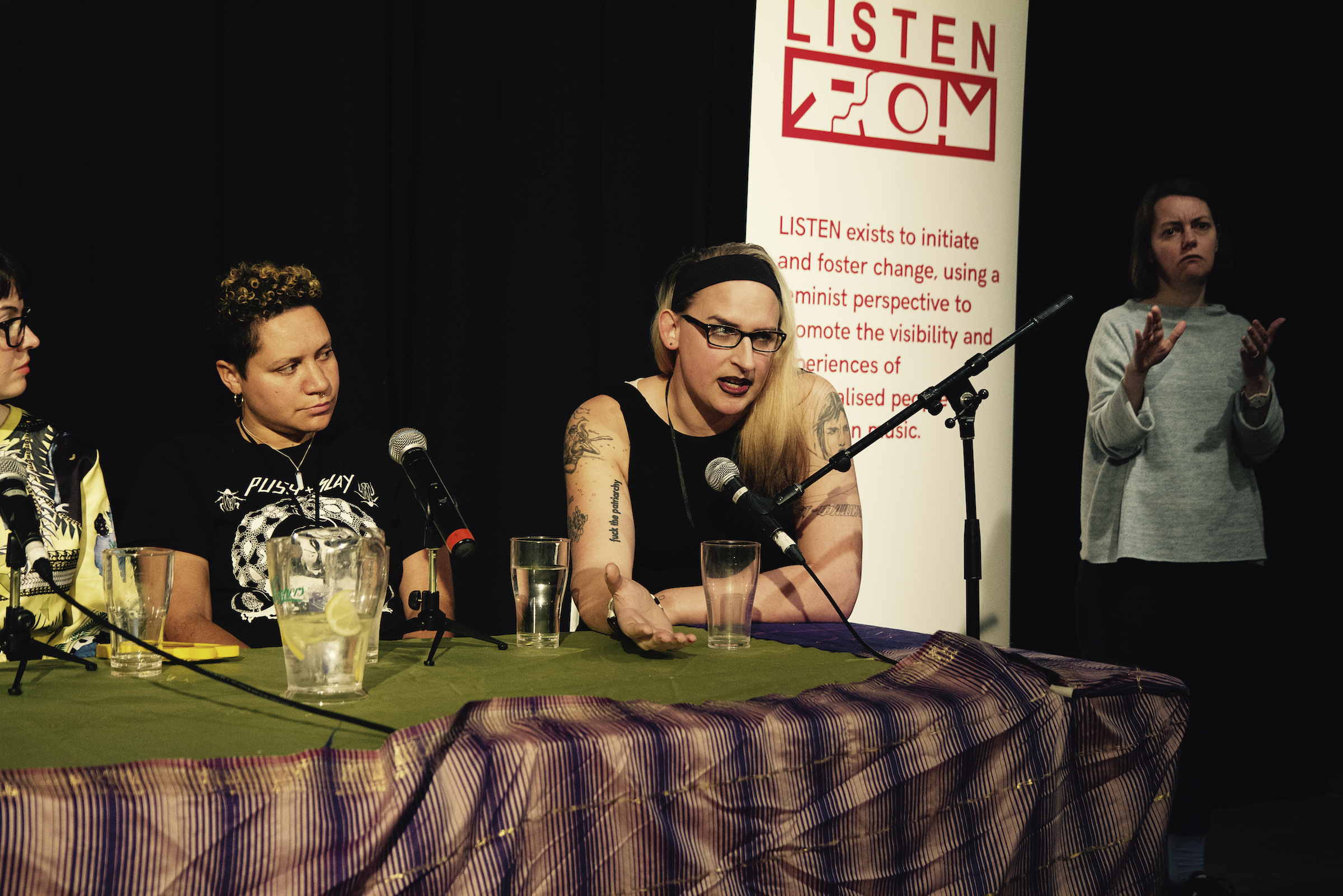Feminist Futures, Perceptions and Realities: LISTEN 2016
By Simona Castricum
On the weekend I rediscovered the future in my feminism. Trying to stay afloat above the pressure — anxiety — of social justice discussion is a task, activism burnout is a thing. One reason I go to conferences is to rejuvenate the mind; the panels we choose inspire us, lift us out of our confusion. We see the barriers to our work from another point of view. We also get to interact with people that have some great ideas – or even people with no idea. We get to ask questions.
Full disclosure, I was a panelist and a moderator on the weekend, and I’m on LISTEN Records. There you go — that’s my conflict of interest.
At Feminist Futures by LISTEN in Melbourne, I did one of my favourite things where I try to smash the concept that perception is reality. I’m tired of how curated online environments enable such a culture of fantasy, passivity and avoidance that I want hyperreality, not the augmented ones we sold and/or forced upon us. Despite the fuck tonne of online exposure, airplay or social media commentary some people might get, when we see people in the flesh, hear their voices, see their faces — we connect so importantly with messages and contexts that are really critical to the issues we speak about. These issues are so deep, complex and triggering — particularly in social justice — we can forget we are dealing with high emotions and personal safety — not career feminism or the theatre of call out. It’s that difference between the online and conference forum — or even the conversational panel versus the lecturous keynote — that is critical to me, because if you’re not there, you’re not really there.
Let’s get to that later, but for those playing at home, let’s get amongst it shall we?
This year’s LISTEN Conference was sold out, so I wasn’t at day one. But word is that Aotearoa musician and writer COCO SOLID set up the the conference with the sharpest of links about how white feminism and respectability politics uphold the scams of capitalism, white supremacy and patriarchy. But her critique is about love, not a call out. Meanwhile her call on LISTEN to invite more Australian Indigenous people to speak is one that resonates with me and throughout the Twittersphere.

Another COCO SOLID quote: “If your feminism/activism doesn’t involve more than tweets, screenshots, column inches. Who are you doing this for?” Outright, and might I add that if your participation in a feminist conference program is about self promotion, social capital or justifying shitty market positions, sit down and pass the mic. Just listen. Be present. Perhaps make that idea you floated about going out for a coffee your work to do. I’m glad that Alterity Collective’s Wahe and Diepop’s KT Spit get to speak about the inclusive spaces they create — I’d like to have had them platformed more as how they serve as industry precedents. Instead I’m clumsily questioned into articulating my experience of assaults, fetishisation, erasure and vilification in both venues and the music industry over 10 years.
I go on to talk about how I’m so often cast as the aggressor because people have venues to run, brands to protect and they don’t have time for my trauma, yet demand my representation and civility. I recount one venue operator telling me ‘they don’t run a blue light disco’, and that I’m the bully — the audience gasps. But I have to stop talking before I have an episode as the question becomes impossible to answer; the visions of those people hurting me merge with those at the end of the panel who benefit from the theatre of lip service that’s become live at Trades Hall. Is my trauma being used as a prop here? Who on this panel is complicit in this silencing; directly benefiting its reward of social and industry capital? My body begins to rock so much I cannot hear until moderator Brooke Powers floats the idea that safe space is fashionable. Well then, how quickly that can be taken away and I immediately think about who benefits from keeping space dangerous. I am unable to speak. Who turned the live Tweeting off in that session, eh?
Speaking of call-outs and self appointed ‘allies’, “I’m the Ally McBeal of your dreams!” sums up token allegiances quite well. A panel on call-out culture can only be full of brilliant one-liners and mic drops, but in all seriousness “we’re not party-pooping to poop the party, we’re doing it to make the party better!” insists Trixie Darko — and I believe it. But how does it play out? Celeste Liddle is steadfast — making no excuses for her targeting of Warren Mundine over erasing existing narratives by aboriginal women of domestic violence. Wahe spoke earnestly about the calling in process and the labour that call-in requires. Holding space in our hearts, minds and actions for the experiences of those who have been hurt is really important to facilitate better accountability when shit goes down.
Alok Vaid-Menon’s stream of consciousness from the streets of New York City was an unprecedented experience — and that’s the poetry and the performance right there. Question time for Alok’s keynote was surprisingly silent. What will stay with me the most from the ‘Sounding out the binary’ panel is self-care: how over-emphasised it is, and how it can become burdensome on top of our own self-preservation. It is not a traumatised individual’s role to just take more meds and stay in therapy. The community needs to actively hold space and break the patriarchal, white supremacist structures of violence or speak louder against the white feminist, cisnormative oppressive bullshit. In other words — people with evidently more privilege who do not exist in seriously hostile environments need to do the work together for those on the margins of survival. People of colour, transfeminine and non-binary people need more help.
Geryon’s suggestion that cisgender people should consider the space they take up in events is super important. And, while the current wave of female-focused music collectives are positive, they also leave no space for queer non-binary people to come out or be visible. This was felt so strongly. That is one feminist future right there people.
Pre-internet, when The Face or Interview Magazine published a photograph backwards, that’s how an entire country understood that person, or even a building. It happened a lot in Australian magazines in the 1970s. LISTEN made me understand that phenomenon is still happening in a very different way — and how it happens locally. Like ‘straight passing privilege’ is a thing — where queer identities get erased because journalists just make assumptions you’re heterosexual because you don’t present evidently queer (whatever that is anyway). Totally Mild’s Elizabeth Mitchell was able to open up how her queer identity is of no interest to journalists. Meanwhile, June Jones of Two Steps on The Water lamented how they were too often reduced to cis editorialised perspectives of trans issues when all they wanted to talk about was music. And don’t get Jenny McKechnie started on how Cable Ties and Wet Lips get mistaken as Riot Grrrl (and she wasn’t even a panelist; surely next year?).

I dig harder for relationships between ‘intentions’ and ‘perceptions’. Many of the names at LISTEN are people we know something about because we played a show a few times, or read them religiously or connected so hardly with the last record. The way that played out a few times was unexpected. Like, how fucking amazing Celeste Potter from Ouch My Face was, who has been screaming down my car radio speakers for a few years now. This time, on a panel eleven people deep, she commanded my awe as she talked about her experiences of starting in music, how she keeps going and the price she pays for it in pain as a sufferer of fibromyalgia.
If I had a dollar for every time I shook my head wishing there were some dudes in the audience to have heard what I just heard, I’d have had enough to buy a few LISTEN t-shirts from the awesome folks at the Merch stand (now those folks need more props right?). I want to see a few supposed dudes and male feminists check their privilege and allegiance instead of fearing public humiliation. Do the work men — three days of your life in 2017 for the next conference, for a critical mass of you might actually change the city. Once more with feeling — it’s those who have the most to lose that are the ones who will fight you the hardest and dirtiest to retain it. We see you.
After the weekend I feel a bit renewed to pursue hyperrealism vs hyperbullshit and how platforms and forums make it so difficult to cut through to the silence and the truth. One of the first songs lyrics I ever wrote in 1992 went ‘to me, all is dark and I’ll tear you apart to reveal a true substance to see if I can start’. While my feminist instincts are informed by these first principles, my future feminism knows now where to keep going.
Feature image credit: Madeleine Bishop.

